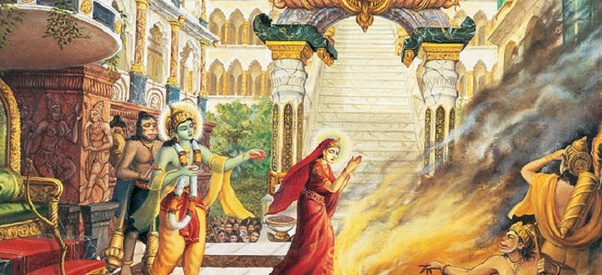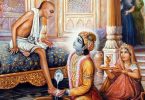Question: One answer I have heard as to why Rama banished his beloved and pregnant wife Sita to reside with Valmiki in his ashram was “As the ideal king, Rama was setting the example of a ruler placing the interests and contentment of His citizens above His own happiness.”
Doubt: If Lord Ramachandra came to be an example of how to rule, then the situation of banishing Sita due to gossip is confusing. Rumors were simply gossip and Lord Rama knew of Sita’s innocence. If the explanation above is the reason for Rama’s sending Sita away, He is setting the example that even if a woman is innocent you would treat her the same as if she was guilty if there is gossip about her. This would be a dangerous example to set for those that rule.
How to answer this doubt?
Is it not sufficient to say that this was their Rasa, their love in separation?
Are there additional explanations, which dharmic persons can relate to?
Answer by Romapada Swami:
Sri Govindaraja has noted in his introduction to Chapter 5 of Bala-kanda that the author of the Ramayana has described how Lord Rama separated Sita-devi from Him in order to describe His supremely compassionate nature.
It is a basic principle that the common people do whatever the leaders do (Bhagavad-gita 3.21). It is another basic principle that only the intelligent can distinguish between following and imitating powerful leaders (Srimad Bhagavatam 10.33.31). It is described in Canto 7 of this great book that since some less intelligent people in Rama’s kingdom misunderstood the mother of the universe, Sita and began to take advantage of her life to indulge in sinful activities, the gravely thoughtful Rama, the very personification of dharma, decided to sacrifice His association with His most beloved Sita for the sake of steering His citizens, who were like His sons and daughters, towards the right track of auspiciousness. That is the point brought out in the commentary above.
Another point of consideration is that Sita-devi is more merciful than Rama and as such, she would not have been able to tolerate the misconceptions and criticisms of her character by her own subjects because Sita-devi also loved the citizens like her children. It should be noted that when Indra’s son in the form of a crow bit her, she didn’t even complain about it to Rama, and she forgave the raksasis who had tormented her and protected them from Hanuman’s fury.
Rama knew Sita’s nature very well and so protected her from having to hear such cruel words. By the arrangement of Lord Brahma and Narada, two pure devotees of Sita-Rama, the entire Ramayana was then arranged to be composed by a neutral third party, Valmiki, an acknowledged authority absorbed in samadhi, in order to enlighten the citizens of Ayodhya about the truth of Sita’s character. The project succeeded. Towards the end of the Ramayana, the citizens realized their error and wanted her to return.
This is the duty of a dharmika king. He is expected to love His subjects like His own children. If one’s children begin to doubt the chastity of their chaste mother, it is the duty of a righteous father to do all that it takes to enlighten them.







